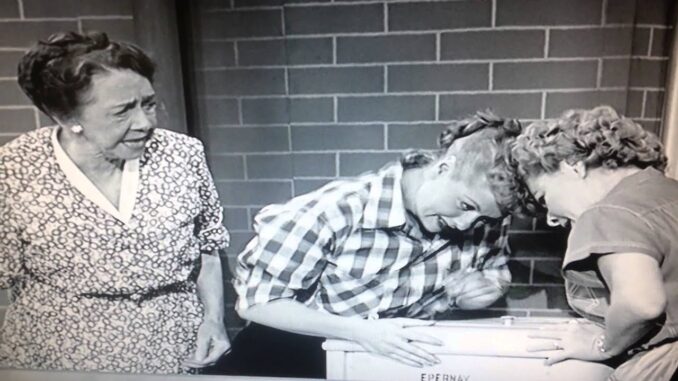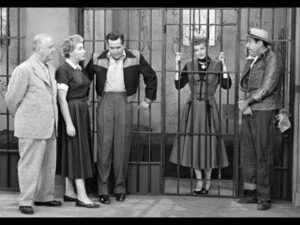
Introduction: More Than Just a Comedy?
For decades, I Love Lucy has been beloved for its slapstick comedy, iconic catchphrases, and heartwarming characters. But what if there’s more lurking beneath the surface? A growing fan theory suggests that the show was far darker than it appeared. Could Lucy’s antics be masking a deeper, more unsettling reality?
The Origins of the Fan Theory
Fans have dissected classic sitcoms for years, and I Love Lucy is no exception. Some viewers believe that the show’s seemingly lighthearted moments are veiled critiques of societal norms, marital strife, and personal identity struggles.
Why This Theory Holds Weight
While I Love Lucy excelled in delivering laughs, many episodes featured recurring themes of control, deception, and frustration. Fans argue that these elements reveal a darker undercurrent.
Lucy’s Dreams and Desperation
Lucy Ricardo often dreams of stardom, but her ambitions are constantly thwarted by Ricky. On the surface, these moments are comedic, but they could symbolize a woman trapped by societal expectations.
A Cry for Independence?
Lucy’s schemes to break into showbiz may reflect a deeper desire to escape her domestic role. Could her exaggerated antics be a satirical take on the limited opportunities for women in the 1950s?

Ricky’s Role: Love or Control?
Ricky Ricardo, the charming Cuban bandleader, frequently puts his foot down when Lucy steps out of line. Fans suggest that Ricky’s authority could represent the oppressive dynamics of mid-century marriages.
Is Ricky a Villain in Disguise?
While Ricky often plays the role of the loving husband, his actions—yelling, punishing, and gaslighting Lucy—have raised eyebrows. Could these moments hint at a darker relationship dynamic?
Ethel and Fred: Partners in Subtlety
Ethel and Fred Mertz, the Ricardos’ best friends, provide comic relief but also mirror the show’s underlying tensions.
Ethel’s Frustrations
Ethel occasionally shows disdain for Fred’s penny-pinching and outdated attitudes. Some fans believe her complaints hint at unspoken struggles within their marriage.
Fred’s Harsh Realism
Fred’s grumpy demeanor and conservative mindset could symbolize the rigidity of traditional gender roles and their impact on personal happiness.
The Show’s Take on Friendship
At its core, I Love Lucy emphasizes friendship, but even here, fans spot darker themes. Lucy and Ethel’s bond often revolves around shared grievances and schemes.
Is Their Friendship a Coping Mechanism?
Could their antics be a way to cope with dissatisfaction in their respective marriages? The theory suggests their camaraderie offers an escape from their everyday struggles.
Financial Tensions Under the Laughs
Money often becomes a source of conflict in the series. Whether it’s Lucy overspending or Fred refusing to loosen the purse strings, financial strain looms large.
Commentary on Post-War Consumerism?
Some theorists argue that these conflicts reflect broader societal pressures, such as the rise of consumer culture and the financial instability of middle-class families.
The Pressure to Conform
Throughout the series, Lucy constantly battles societal expectations, from being the perfect wife to fitting into Ricky’s social circle.
The 1950s Ideal: A Blessing or a Curse?
This recurring tension may critique the post-war ideal of domestic bliss, exposing the cracks in the facade of the “perfect” American household.
Physical Comedy: Hilarious or Hazardous?
Lucy’s physical comedy often places her in precarious situations. From stomping grapes to getting stuck in a giant loaf of bread, these stunts are iconic.
Hidden Metaphors in Slapstick
Could these exaggerated physical challenges symbolize Lucy’s struggles against societal limitations? Some fans believe her comedic mishaps are a metaphor for real-life obstacles women faced.
The Role of Parenthood
Lucy and Ricky’s journey into parenthood was a significant arc in the series. However, even this joyous occasion is not without its darker implications.
Balancing Career and Family
Lucy’s efforts to juggle motherhood with her unfulfilled dreams could highlight the double burden many women experienced in the 1950s.
Cultural and Racial Undertones
Ricky’s Cuban heritage often becomes a point of humor in the series, but fans argue these moments occasionally stray into problematic territory.
Representation in the 1950s
While Ricky was a groundbreaking character for the time, his portrayal also underscores the show’s complex relationship with race and ethnicity.
Lucy’s Breaking Points
Several episodes feature Lucy on the verge of emotional collapse, whether due to her own schemes or Ricky’s scolding.
Signs of Mental Health Struggles?
Fans speculate that Lucy’s exaggerated reactions may point to deeper issues of stress and anxiety, reflecting the psychological toll of her circumstances.
Reevaluating the Show’s Legacy
While I Love Lucy remains a cultural treasure, this theory invites us to view the series through a more critical lens. Could the show’s humor have been a way to explore darker societal issues?
Why This Theory Matters Today
In a modern context, the themes unearthed by this fan theory resonate more than ever. Issues of gender roles, financial pressure, and mental health continue to be relevant.
Conclusion: A Show of Layers
I Love Lucy is undeniably a masterpiece of comedy, but this fan theory reveals a hidden depth. Far from being just a source of laughs, the show may have been a subtle critique of the struggles and expectations of its time.
FAQs
1. Was I Love Lucy intentionally dark?
The creators likely didn’t intend for the show to be dark, but modern interpretations highlight underlying themes that resonate differently today.
2. What makes this fan theory so popular?
The theory invites viewers to revisit a beloved classic with fresh eyes, revealing new layers of complexity and societal critique.
3. Did Lucille Ball ever comment on the show’s themes?
Lucille Ball focused on the show’s humor but acknowledged its groundbreaking nature in addressing topics like interracial marriage and women’s independence.
4. How does this theory change the way we watch the show?
It adds depth, encouraging viewers to see beyond the laughs and consider the societal pressures and personal struggles depicted.
5. Are there other shows with similar hidden depths?
Yes, many classic sitcoms like The Honeymooners and All in the Family also contain subtle critiques of societal norms beneath their comedic exteriors.